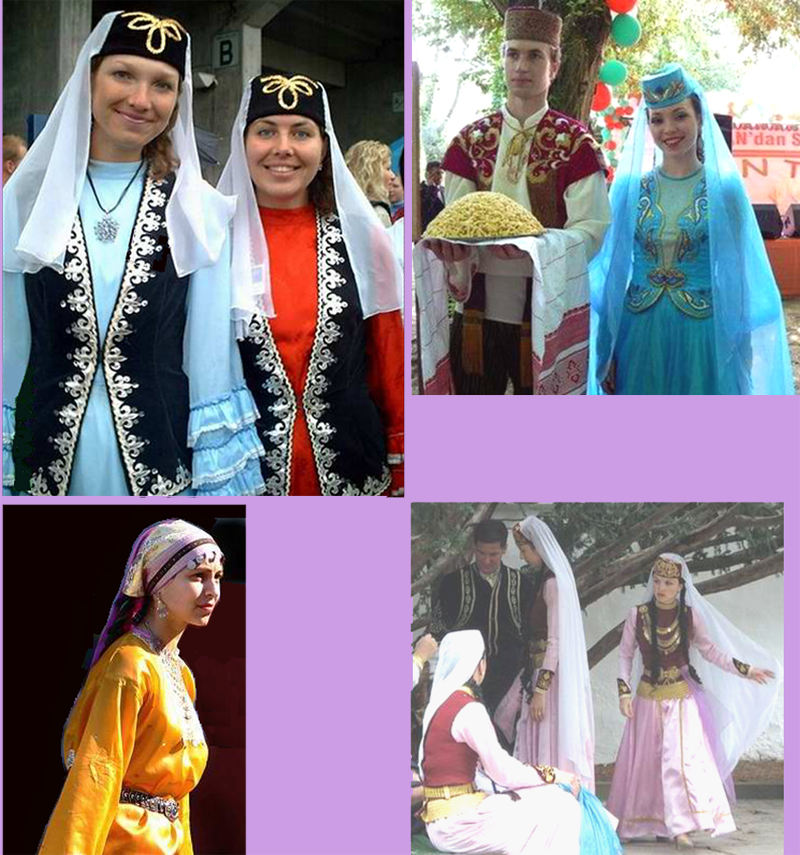

Count Leo Nikolayevich Tolstoy served in the Caucusus during the Crimean War. He wrote several stories about the indigenous people he encountered. In many respects, Tolstoy's writings may be viewed as ethnographic studies. He described their clothing, food, customs, etc.
| abrek | Caucasian mountaineer |
| arba | Caucasian cart |
| arshin | unit of length (28 inches) |
| aul (аул) # | Caucasian village |
| blagovodstvo | noble birth or noble rank |
| balka | ravine |
| barin | gentelman (wealthy owner of land with serfs) |
| batyushka | father (diminutive, endearing, honorific) |
| beshmet | Caucasian shirt |
| buza | millet beer |
| chapura | large wooden cup |
| cherkeska | cape thrown over the shoulders |
| chikhir | Caucasian red wine |
| denshchik | aristocrat's servant (especially, served at the front, during the Crimean War |
| dokha (доха) | sheepskin jacket (but can be from any animal, fur or wool on the outside, leather on the inside) |
| dura, durak | fool |
| dushen'ka | darling, any woman (endearing) |
| flinta | musket |
| Golubchik | Dove (endearing) |
| izbushka | hut used to milk cows, and to boil milk into curds |
| jigit (джигит) | Caucasian brave (courageous fighter) |
| karga | Good? OK? |
| khalat | robe worn at home |
| khata | Cossack house (cabin): gigantic oven/bed, Old Believer icons, featherbeds and pillows piled at one wall, side walls have pots and utensils. Watermelons and squash under benches. |
| khorovod | choral dance for women |
| khorunzhy | Ensign (Cossack) |
| kibitka | Nogaï (Mongol) tent (on cart) |
| koshkildui | "Peace be with you." |
| kriga | place on riverbank for fishing nets |
| kumgan | large pitcher |
| kunak | guest, friend |
| kurda–murda | goods (anything) |
| kurpeï, ovchina | lambskin (fur on the outside, leather on the inside) |
| lapta | ballgame for children |
| ladenka | small (diminutive) bag carried by the religious, can contain a small icon, relics, baptismal cross, etc. |
| lopazik | place where one sits while waiting |
| malolyetka | Cossack not yet enrolled in the cavalry |
| mashtak | horse |
| matushka | mother (endearing) |
| nyanya | babbysitter (older sister) |
| Nogaï Mozdok | Steppe (Mongol) |
| oven bed | печь с лежанкой or печь с полатями |
| papakha | cap (Circassian) |
| peshkesh | gift |
| polushubok | half shuba |
| pomolitsya | to drink a toast (literally: to say one's prayers) |
| porshini | leggings of undressed leather |
| rab (раб) | slave (Russian) |
| saklya (сакля) | Caucasian hut (flat earthen roof with a red chimney) |
| sakvui | double saddlebag used on a horse |
| sazhen | unit of length (7 feet) |
| sbiten' | non-alcholic peasant drink: water or tea mixed with honey and spices |
| shuba (шуба) | sheepskin jacket (but can be from any animal, fur or wool on the outside, leather on the inside) |
| sorotchka | red kerchief |
| sotnya (сотня) | group of a hundred men, led by a sotnik (сотник). Modelled upon Mongol army (Temujin organized his army into squads of ten, companies of a hundred, battalions of a thousand, and tumen [armies] of ten thousand.) |
| stanitsa (станица) # | A stanitsa is a Cossack village. A walled village, with gates with a thatched roof. Houses surrounded with hedges of acacia, poplars, sunflowers and grapevines. Nogaï servants. Men hunt, fish and fight. Women garden and take care of the cattle. Kizyak (dried dung) used as fuel. Shops (owned mostly by Armenians) located in the stanitsa. |
| tomasha | slave (Caucusus) |
| yamshchik | postillion (wagon driver) |
| yok | no (Caucasian) |
| zakuski | cakes, confections |
| zanatchka | Standard (banner, flag), each warrior can make his own |
| zipun (зипун) | jacket of ox leather inside, lamb wool fur outside |
© Copyright 2006 - 2019
The Esther M. Zimmer Lederberg Trust
 Web Site Terms of Use
Web Site Terms of Use